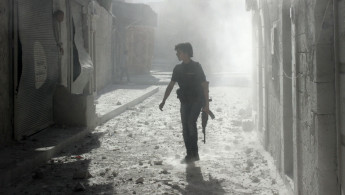Ahrar al-Sham denies links to Syrian religious police force
One of Syria's largest rebel groups has said it will not cooperate with a religious police force established in Aleppo, amid fears of creeping ultra-conservatism in rebel ranks.
2 min read
One of Syria's largest rebel groups denied links to the religious police force [AFP]
Syrian rebel group Ahrar al-Sham has denied claims that it has set up a religious police force to administer territory the Islamist group controls in northern Aleppo.
On Saturday, a number of armed opposition groups announced the establishment of "sharia police".
A video showed several men announcing the formation of the Dar al-Hisbah "promotion of virtue" committee, using a Quranic verse to justify its formation. The clip had echoes of the "muttawah" religious police force in Saudi Arabia.
The formation of the Dar al-Hisbah has been condemned by Syrian anti-regime activists.
Yaser al-Taei, communications officer with Ahrar al-Sham, said that his group had no connection to the religious police force, according to opposition newspaper Zaman al-Wasl.
Jaish al-Fatah, a rebel alliance that controls Idlib province and includes al-Qaeda, launched a "morality campaign" on 23 October, to encourage a more conservative dress code.
The judicial body for Marrat Numan in Idlib province launched the campaign named My veil, my chastity at a packed outdoor theatre with men, women and children seated in seperate sections.
A statement by the group also enforced a conservative dress code in the province, with women forbidden from wearing make-up, jewellery or "fine" clothing.
"[Those guilty] will be punished by the women's section, as will her husband or guardian or boss or school director at the place they are found not dressed modestly," the statement read.
The group also ordered women not to wear veils that were coloured, transparent or decorated - or to leave their homes wearing perfume.
It stipulated that women should also conceal their bodies in loose, plain clothing and not show their ankles.
They were, however, not told to wear niqab, or face covering, despite many ultra-conservative salafi-jihadi groups, such as the Nusra Front, operating in the area.
The Syrian rebels - including Nusra, al-Qaeda's franchise in Syria - have largely stayed away from intefering too heavily in the social codes of areas they run.
However, Russian intervention has sparked fears of a radicalisation of the rebel ranks, with talk of "jihad" among opponents of Bashar al-Assad becoming more common.
On Saturday, a number of armed opposition groups announced the establishment of "sharia police".
A video showed several men announcing the formation of the Dar al-Hisbah "promotion of virtue" committee, using a Quranic verse to justify its formation. The clip had echoes of the "muttawah" religious police force in Saudi Arabia.
The formation of the Dar al-Hisbah has been condemned by Syrian anti-regime activists.
Yaser al-Taei, communications officer with Ahrar al-Sham, said that his group had no connection to the religious police force, according to opposition newspaper Zaman al-Wasl.
|
|
|
| The video statement by could not be independently verified by al-Araby al-Jadeed although believed to be authentic by activist groups [YouTube] |
Jaish al-Fatah, a rebel alliance that controls Idlib province and includes al-Qaeda, launched a "morality campaign" on 23 October, to encourage a more conservative dress code.
The judicial body for Marrat Numan in Idlib province launched the campaign named My veil, my chastity at a packed outdoor theatre with men, women and children seated in seperate sections.
A statement by the group also enforced a conservative dress code in the province, with women forbidden from wearing make-up, jewellery or "fine" clothing.
"[Those guilty] will be punished by the women's section, as will her husband or guardian or boss or school director at the place they are found not dressed modestly," the statement read.
|
— Jenan Moussa (@jenanmoussa) October 26, 2015" style="color:#fff;" class="twitter-post-link" target="_blank">Twitter Post
|
The group also ordered women not to wear veils that were coloured, transparent or decorated - or to leave their homes wearing perfume.
It stipulated that women should also conceal their bodies in loose, plain clothing and not show their ankles.
They were, however, not told to wear niqab, or face covering, despite many ultra-conservative salafi-jihadi groups, such as the Nusra Front, operating in the area.
The Syrian rebels - including Nusra, al-Qaeda's franchise in Syria - have largely stayed away from intefering too heavily in the social codes of areas they run.
However, Russian intervention has sparked fears of a radicalisation of the rebel ranks, with talk of "jihad" among opponents of Bashar al-Assad becoming more common.





 Follow the Middle East's top stories in English at The New Arab on Google News
Follow the Middle East's top stories in English at The New Arab on Google News
![Israeli forces ordered bombed Gaza's Jabalia, ordering residents to leave [Getty]](/sites/default/files/styles/image_330x185/public/2176418030.jpeg?h=a5f2f23a&itok=_YGZaP1z)

